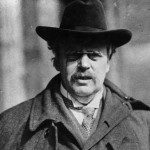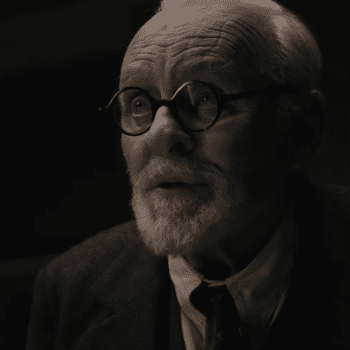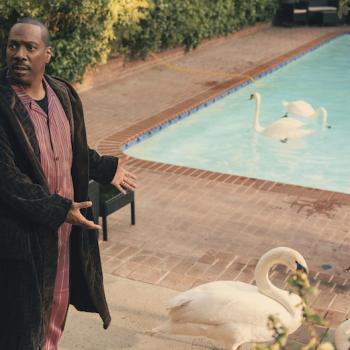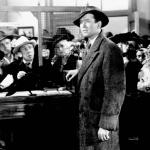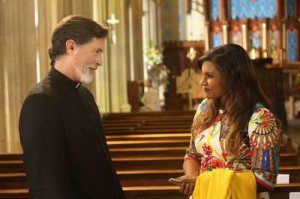 A couple of weeks ago, I wrote a little piece on Netflix’ House of Cards and Fox’s Last Man On Earth. I had reviewed an episode of each for Plugged In, and both episodes kinda got religious on me. Weird, I thought. Not often television engages with faith so explicitly. What’re the chances?
A couple of weeks ago, I wrote a little piece on Netflix’ House of Cards and Fox’s Last Man On Earth. I had reviewed an episode of each for Plugged In, and both episodes kinda got religious on me. Weird, I thought. Not often television engages with faith so explicitly. What’re the chances?
Pretty good, in retrospect. This March, television’s been on a religious jag.
Paige Jennings, daughter of Soviet spies Philip and Elizabeth, got baptized on the March 4 episode of FX’s The Americans. Her atheist parents attended the baptism, sitting several rows away—metaphorically distancing themselves from their daughter’s decision. Six days later, The Mindy Project on Fox focused on the faith of Danny, Mindy’s boyfriend—and featured Stephen Colbert as a priest.
“I so enjoyed your speech!” Mindy tells Colbert’s Father Michael.
“Sermon,” Father Michael corrects.
“It was the best part of the show!”
“Mass.”
The History Channel’s Vikings is embroiled in a time when pagans and Christians were battling for the very soul of Europe. And in The Walking Dead last night, a clergyman named Gabriel played a critical (if not particularly positive) role in the episode “Spend.”
Religion has been so big on the small screen lately that an organization called the Hollywood Prayer Network is asking its members to “Pray for God to use some of the amazing spiritual storylines that are popping up in television shows on every network.”
You could argue that some folks are getting more spiritually challenged while sitting on their own couch than sitting on a church pew. Television is showing a greater willingness to talk about faith than even some of the faithful. What’s up with all this religion on the telly?
Now, let’s backtrack and admit that talking about faith isn’t the same thing as giving theology a hearty pat on the back. All the shows mentioned above are problematic—sometimes extraordinarily so. And their depictions of Christianity have been be equally problematic. None would be explicitly encouraging to the faithful. Mindy Kaling, star of The Mindy Show, calls Colbert’s Father Michael “very judgemental.” Father Gabriel in The Walking Dead is a back-biting, Bible-ripping coward. Earlier in Vikings, Christians went so far as to crucify the monk Athelstan, one of their own. Let’s not pretend that any of these shows is trying to convert anyone.
But here’s what I find interesting: These shows are exploring what it really means to have faith—not as a benign social club full of Sunday School smiles and potluck dinners, but an awesome, sometimes terrifying force in people’s lives.
The Washington Post’s Alyssa Rosenberg singled out The Americans and Vikings for doing something “that almost nothing else in pop culture dares to attempt: It depicts Christianity as a seismic force, something capable of producing profound transformation in both individuals and society.”
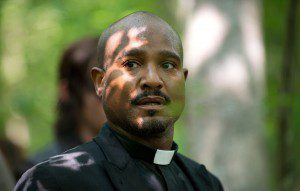 Christianity can indeed be that transformational force. I’ve seen it sweep into people’s lives like a tornado, picking them up, whirling them around and, finally, setting them down in a place they never would’ve expected. We do not worship a pocket-size God, though sometimes we pretend we do. To let him work within our lives does not lead to milquetoast deeds, but to lives filled with habanero peppers: He likes to get us moving.
Christianity can indeed be that transformational force. I’ve seen it sweep into people’s lives like a tornado, picking them up, whirling them around and, finally, setting them down in a place they never would’ve expected. We do not worship a pocket-size God, though sometimes we pretend we do. To let him work within our lives does not lead to milquetoast deeds, but to lives filled with habanero peppers: He likes to get us moving.
Often, our entertainment tacitly ignores these wild impulses of faith. Sure, some movies talk explicitly about its power. I write about them in this space all the time. But often I’m writing about underlying religious themes or motifs found in film, not overt manifestations or come-to-Jesus moments. It’s rare to see a movie insist, like Selma or Unbroken do, that faith can change lives.
But maybe that makes sense. Movies, after all, have a narrow window in which to discuss heavy matters. But television shows have years to spin their tales, if they’re lucky. And that allows space for the characters, and vicariously the viewers, to ask some big questions. Even in shows where religion isn’t a consistent element—Mad Men or Breaking Bad, for example—we find Walter White and Don Draper embroiled in their own personal morality plays, where they’re asking what it means to be good or great or worthy … and in whose eyes. In the best television shows, it’s not just about saving the day. It’s about saving (or damning) the souls of its most important characters.
Pop culture pundits say the best stories are being told on television these days. There’s a willingness to let a story unspool on TV, slow and purposeful. We get to know these characters—what they love, what they fear and, maybe, what they believe. There’s a willingness to go into the treacherous waters of religion now, a desire to dare the discussion. And even when that discussion turns ugly, I’m grateful that they at least acknowledge the subject’s power. Faith is something worth getting worked up over. And if our storytellers aim to tell us honest, powerful stories, it’s something that can’t be ignored.



